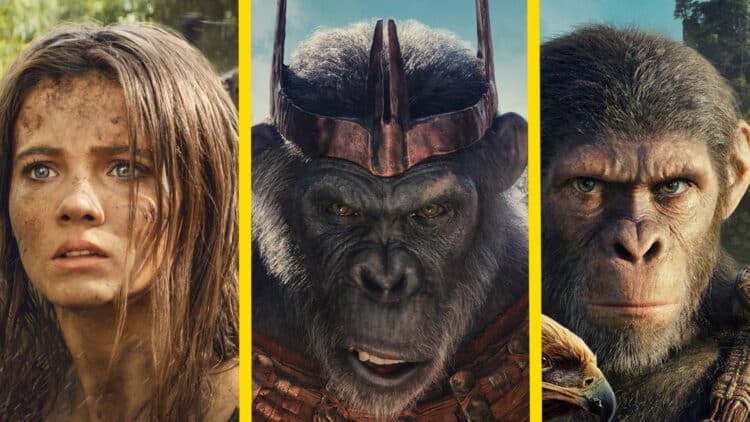To follow what filmmakers Rupert Wyatt and Matt Reeves did in the last three Planet of the Apes movies is a ballsy move. Director Wes Ball was well aware of it, too, hence it took some convincing for him to helm Kingdom of the Planet of the Apes. Ball knew there was no way this film could reboot or retell the legend of Caesar; instead, it chose a different path: To create a linear continuation that pays tribute to the history of the franchise while continuing to ask pertinent questions about humanity – or the lack thereof.
Set hundreds of years after the events of War for the Planet of the Apes, different clans of apes are spread out with their own unique cultures and customs. At this point in time, humans have completely devolved while the apes are the dominant species of the land. The story’s main protagonist is Noa (Owen Teague), a young chimpanzee of the Eagle clan who lives in harmony among his family and friends. His life changes when Proximus Caesar (Kevin Durand) enslaves Noa’s clan and several others. This new Caesar isn’t as benevolent as the previous one, though, as he harbours his own devious plans to take ape to the next level of superiority. Now, it’s up to Noa, a kind orangutan named Raka (Peter Macon), and a mysterious human named Mae (Freya Allan) to free the apes.
Asking all the right questions about society’s inability to get it together
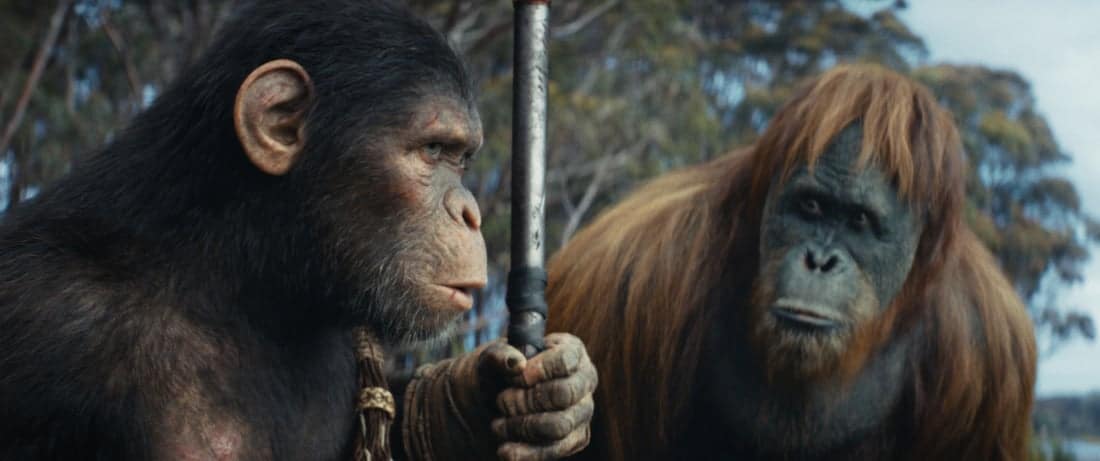
Josh Friedman’s script for Kingdom of the Planet of the Apes borrows various influences from the previous movies in the franchise. The noticeable sci-fi adventure undertones from the original films are all present, but there’s also the powerful sense of gravitas and poignancy found in Rise, Dawn, and War bubbling in every scene. It’s a different time period with different challenges and different characters, but it’s clear that society still hasn’t learned its lesson in how to get along.
That’s the crux of the story, really. It operates as a metaphor for how we continuously find ourselves at loggerheads with each other and the ecosystem around us. Even in this world where the apes have won, there’s still division among them, as some warp the teachings of Caesar to act violently in his name, while other groups are seen as of lesser importance. The film asks the important question: Will society ever find a way to be harmonious and treat each other with respect and dignity? The answer is up to the audience to decide here.
Kingdom of the Planet of the Apes is visually stunning and packed with powerhouse performances
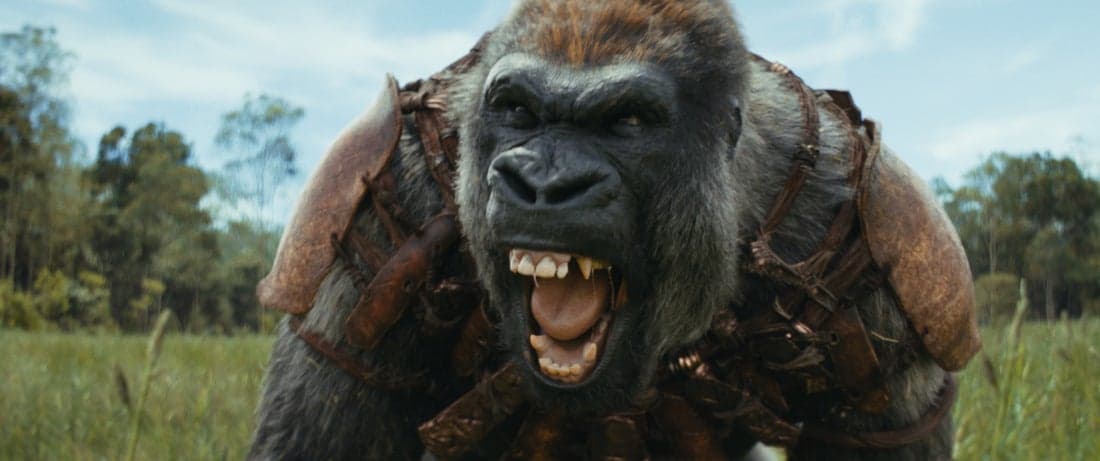
Visually, Wes Ball cut no corners in creating an immersive and eye-catching world. Building on what came before, Kingdom of the Planet of the Apes showcases a number of impressive locations and sprawling setpieces that celebrate what happens when nature wins, but also revisit the relics and ruins of humanity’s time as the superior species on this planet.
In terms of the apes, the motion-capture technology continues to develop and evolve at an astonishing rate. From seeing the specks of dust on their fur to how every minute movement or twitch on their faces adds to the emotion, it’s staggering to think of how far this series has come in the past decade to deliver lifelike digital creations.
Like the previous films, the apes steal the show and take centre stage, which means it’s up to the mo-cap-enhanced actors to convince they’re the animals on screen. As the lead, Owen Teague doesn’t try to turn Noa into another Caesar; instead, he embraces how this character is different and has his own unique path of self-discovery to follow. Noa doesn’t have all the answers, nor does he try to pretend he does, as he only acts on what he thinks is right. Peter Macon’s Raka also touches the soul as an instantly likable character, while acting as the moral compass for Noa and Mae. Raka believes in Caesar’s lessons and sees how others have misrepresented his teachings for their own gain; however, he still insists in empathy and being kind rather than violence. Elsewhere, Kevin Durand’s Proximus Caesar oozes all the megalomania and nefariousness to make him a memorable villain in the same vein as someone like Koba.
Is the film worth watching?
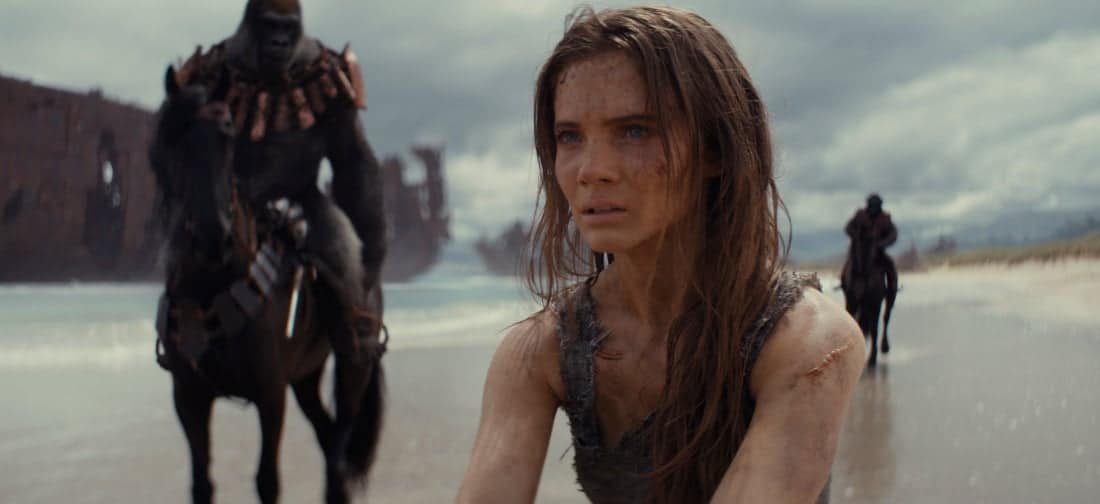
While many people believed Kingdom of the Planet of the Apes was nothing more than a cash-grab, the film defies the doubters to add another thought-provoking and emotionally resonating installment in the series. It pays homage to what came before it and respects the history of the movies before it, but it also says something important in the end. Right now, the franchise can do no wrong. It truly is: Apes. Together. Strong.
Kingdom of the Planet of the Apes |
|---|
Many years after the reign of Caesar, a young ape goes on a journey that will lead him to question everything he's been taught about the past and make choices that will define a future for apes and humans alike. |
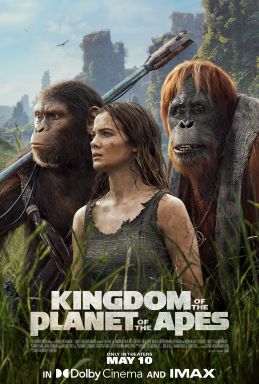 |
|---|
| Studio: 20th Century Studios |
| Running Time: 145 minutes |
| Release Date: May 10, 2024 |
| Cast: Owen Teague, Freya Allan, Kevin Durand, Peter Macon, William H. Macy, Neil Sandilands |
| Director: Wes Ball |
| Writers: Josh Friedman |
| Genre: Action, Adventure, Sci-Fi |
| Box Office: N/A |
The Review
Kingdom of the Planet of the Apes
Kingdom of the Planet of the Apes matches the standard and poignancy of what came before it.
Review Breakdown
-
Verdict

